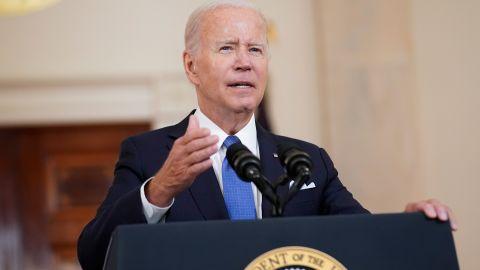US Grants Liberians Temporary Legal Status

Flashback: President Joe Biden speaks at the White House in Washington, on Friday, June 24, 2022, after the Supreme Court overturned Roe v. Wade.
US President Joe Biden has approved a temporary legal status for thousands of Liberians in the US, citing compelling foreign policy reasons — honoring “the historic close relationship” between the two countries.
Biden's move is expected to provide protection for thousands of Liberia from removal and a work authorization permit. Those that are expected to benefit, according to Biden, are Liberians who arrived in the US during a time when conditions back home prevented them from returning safely, including through May 20, 2017, and have since established family and community ties in the United States.
Others are Liberians, who have been issued Temporary Protection Status (TPS) in the past or Deferred Enforced Departure (DED), and those that completed or were in the process of completing the Liberian Refugee Immigration Fairness (LRIF) provision status-adjustment process.
“Pursuant to my constitutional authority to conduct the foreign relations of the United States, I have determined that it is in the foreign policy interests of the United States to defer through June 30, 2024, the removal of any Liberian national, or person without nationality who last habitually resided in Liberia, who is present in the United States and who was under a grant of DED as of June 30, 2022, as well as any Liberian national, or person without nationality who last habitually resided in Liberia, who has been continuously physically present in the United States since May 20, 2017,” the US President said in a Memorandum to the US Secretary of State and the Secretary of Homeland Security.
“I have also determined that any Liberian national, or person without nationality who last habitually resided in Liberia, who was under a grant of DED as of June 30, 2022, or who has been continuously physically present in the United States since May 20, 2017, should have continued employment authorization through June 30, 2024.”
However, the US President made it illegal for Liberians who the Secretary of Homeland Security, Alejandro N. Mayorkas determined to be removed in the interest of the US to be granted this temporary legal status; or Liberians whose presence or activities in the US provides reasonable grounds to believe there would be potentially serious adverse foreign policy consequences for the United States; individuals who have voluntarily returned to Liberia or their country of last habitual residence outside the United States for an aggregate period of 180 days or more, and individuals who are subject to extradition.
With Biden's latest movie, Liberia remains one of 12 countries whose nationals continue to be granted temporary protected status, a program that former President Donald Trump pursued to severely restrict in response to the backlash that regular extensions allowed people to live in the US for years.
Since 1991, the United States has provided safe haven for Liberians who were forced to flee their country as a result of armed conflict and widespread civil strife, in part through the grant of Temporary Protected Status (TPS). The country's armed conflict ended in 2003, and TPS for affected Liberian nationals ended effective October 1, 2007. However, President George Bush at the time deferred the enforced departure of those Liberians originally granted TPS.
And when President Barack Obama took over, he in successive memoranda, extended that grant of Deferred Enforced Departure (DED) to March 31, 2018. President Donald Trump then determined that conditions in Liberia did not warrant a further extension of DED, but that the foreign policy interests of the United States warranted an orderly transition period for Liberian DED beneficiaries. President Trump later extended that DED transition period through March 30, 2020.
However, the US Congress a year early in December 2019, enacted the National Defense Authorization Act (NDAA) for Fiscal Year 2020, which included the Liberian Refugee Immigration Fairness (LRIF) section that was limited in scope. It granted Liberians who had been continuously living in the US since November 20, 2014, as well as their spouses and children, eligibility for adjustment of status to that of a lawful permanent resident (LPR).
The NDAA gave eligible Liberian nationals until December 20, 2020, to apply for this adjustment of status and after the enactment of the LRIF provision, Trump further extended the DED transition period through January 10, 2021, to ensure that DED beneficiaries would continue to be eligible for employment authorization during the LRIF application period.
But the LRIF application process was new and complex, resulting in some procedural and administrative challenges — and recognizing these difficulties, Congress enacted a 1-year extension to the application period in the Consolidated Appropriations Act, 2021, however, the law did not provide for continued employment authorization past January 10, 2021.
“Through my memorandum of January 20, 2021 (Reinstating DED), it was subsequently reinstated through June 30, 2022, in order to permit employment authorization for eligible Liberians while they made their applications for adjustment of status under the LRIF provision.”
“There are compelling foreign policy reasons to extend DED for an additional period for those Liberians presently residing in the United States who were under a grant of DED until June 30, 2022, as well as to defer enforced departure for Liberians who have been continuously present in the United States since May 20, 2017. In addition to updating the continuous presence requirement, I have also determined that it is appropriate to include qualifying Liberians whose LRIF applications have been denied for reasons other than ineligibility under sections 7611(b)(1)(C) and (b)(3) of the NDAA in this DED designation.”
